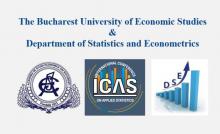The Deputy President of the NSI Svilen Kolev, PhD participated with a report and as a moderator during the 17th International Conference on Applied Statistics, which was held in the period of 14 – 15 November 2024 in Bucharest, Romania. The event was organized by the National Institute of Statistics of Romania and the Department of Statistics and Econometrics of the Bucharest University of Economic Studies.
The aim of the Conference is to provide an opportunity for academics, researchers, PhD students, and business professionals to meet and present their respective research results on topics related to quantitative analysis and applied statistics.
The Event Program included 9 parallel sessions devoted to various topics in the field of applied statistics, with Dr. Kolev moderating the first session on the challenges and opportunities of official statistics. In addition, the Deputy President of the NSI presented a report on “Innovative Practices Implemented in the NSI of Bulgaria as a Result of the Third Round of European Statistical System Peer Reviews”. The paper describes the experience of the National Statistical Institute after the third peer review for Bulgaria within its membership in the European Statistical System (ESS), conducted in the period from March 28 to April 1, 2022 and contains examples of innovative practices, implemented in the NSI and the Other National Statistical Authorities as a result of the recommendations outlined during the peer review. Among the good examples mentioned were the increase in transparency and the promotion of official statistics amid the public, the establishment of an advisory council to the President of the NSI with the participation of Employers’ organisations, cooperation with the Other National Statistical Authorities and the Academia, the initiative taken to improve the qualifications of NSI staff and the retention of experts, strengthening cooperation with the academia and others.
The other parallel sessions in the Conference Program were dedicated to: the use of Artificial Intelligence for the production of statistics, Data mining, Regional economics and applied spatial data analysis, Human capital development and education, Population Economics and applied statistics in social science, Finance and digital assets, Labour Markets, Entrepreneurship and Innovation in the Economy, Algorithms and applications for statistical purposes.



